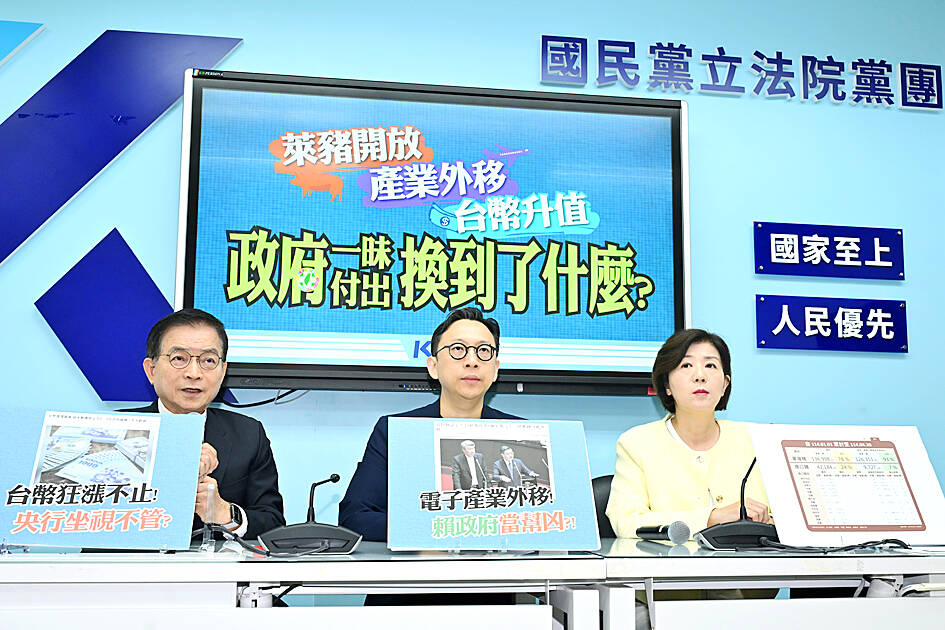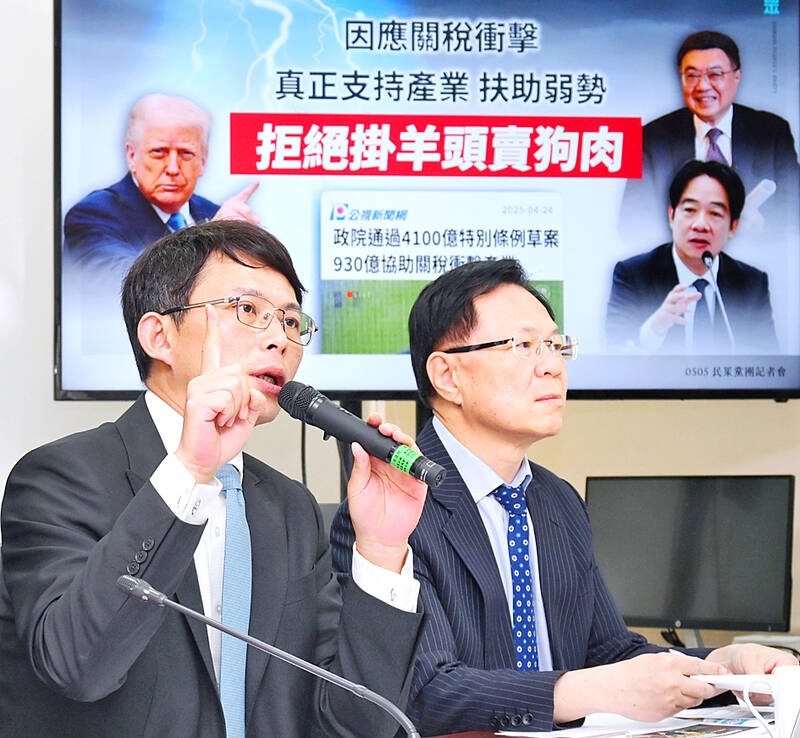The administration of President William Lai (賴清德) surrendered without a fight in the tariff and currency wars, Chinese Nationalist Party (KMT) Chairman Eric Chu (朱立倫) wrote on Facebook yesterday.
Chu also recalled Japan’s asset price bubble in the late 1980s, saying it was an example of economic collapse caused by rapid currency appreciation.
“The yen sharply appreciated due to pressure [from US trade deficit], but the bubble eventually burst, leading to economic collapse and the lost decade [in the 1990s],” Chu said.

Photo: Chen Yi-kuan, Taipei Times
Similarly, Taiwan is facing a tariff war against the US, but Taiwan Semiconductor Manufacturing Co (TSMC, 台積電) handed a US$100 billion investment to the US on a silver platter ahead of bilateral negotiations, he said.
“That is not a strategic arrangement but a giveaway, or a white flag without a war,” Chu added.
The Lai administration surrendered in the currency war without a fight, which the KMT had been warning about, he said.

Photo: Fang Pin-chao, Taipei Times
The New Taiwan dollar has been appreciating from NT$33.2 to below NT$30 against the US dollar over the past few days, Chu said, adding that it was a nearly 10 percent appreciation and that it has caused serious losses to Taiwanese exporters.
“Given that many traditional industries operate on low to moderate margins, a 5 percent appreciation could eat up their profit margin for the year. The steep appreciation within just a few days must have caught small and medium-sized companies off guard and would batter the life insurance industry,” he said.
“While tech and manufacturing industries nationwide are under great pressure, the government is obsessed about creating an optimistic atmosphere that ‘the negotiation went smoothly on the first day’ or ‘the future is under control,’” Chu said, referring to initial Taiwan-US tariff talks.
The Lai administration has been causing internal strife and has been incompetent in external affairs since its inauguration a year ago, he said, referring to the ongoing mass recall campaigns.
Democratic Progressive Party (DPP) caucus whip Ker Chien-ming (柯建銘) in January called for recalls of KMT lawmakers.
The KMT caucus told a news conference yesterday that the Lai administration has been “buttering up” US President Donald Trump since “reciprocal tariffs” were announced last month, while the exchange rate between the New Taiwan dollar and the US dollar skyrocketed by NT$1.462 over the past week.
KMT Legislator Ko Ju-chun (葛如鈞) said the high-tech industrial chain is shifting abroad, as TSMC was investing in the US for free, and Nvidia Corp said it would produce and test its Blackwell chips in Arizona and make its new graphics cards in the US.
The five Taiwanese electronic giants — Wistron Corp (緯創), Asustek Computer (華碩), Gigabyte Technology (技嘉), Delta Electronics (台達電) and Tatung Co (大同) — are also setting up plants in the US, despite the risk of skill drains, he said.
More than 60 percent of Taiwan’s GDP relies on exports, and the increase in tariffs and exchange rates would severely impact industries with relatively low gross profit margins, Ko said.
“The DPP government should tell Taiwanese what such great financial interests of people were traded for in return,” he added.
Separately yesterday, Taiwan People’s Party (TPP) Chairman Huang Kuo-chang (黃國昌) said the central bank continues to deny that US pressure caused the steep currency appreciation, despite wide international media coverage, adding that it is “making fools out of Taiwanese.”
TPP Legislator Chang Chi-kai (張啟楷) cited companies as saying that their first quarter’s profits were wiped out due to the New Taiwan dollar appreciating by NT$1.
The Japanese economy was dragged into a recession for 30 years due to a rapid appreciation in the yen following the country’s signing of the Plaza Accord with the US in 1985, he said, urging Lai to form a strong Cabinet specializing in fiscal affairs.
Additional reporting by Lin Che-yuan

TRAFFIC SAFETY RULES: A positive result in a drug test would result in a two-year license suspension for the driver and vehicle, and a fine of up to NT$180,000 The Ministry of Transportation and Communications is to authorize police to conduct roadside saliva tests by the end of the year to deter people from driving while under the influence of narcotics, it said yesterday. The ministry last month unveiled a draft of amended regulations governing traffic safety rules and penalties, which included provisions empowering police to conduct mandatory saliva tests on drivers. While currently rules authorize police to use oral fluid testing kits for signs of drug use, they do not establish penalties for noncompliance or operating procedures for officers to follow, the ministry said. The proposed changes to the regulations require

The Executive Yuan yesterday announced that registration for a one-time universal NT$10,000 cash handout to help people in Taiwan survive US tariffs and inflation would start on Nov. 5, with payouts available as early as Nov. 12. Who is eligible for the handout? Registered Taiwanese nationals are eligible, including those born in Taiwan before April 30 next year with a birth certificate. Non-registered nationals with residence permits, foreign permanent residents and foreign spouses of Taiwanese citizens with residence permits also qualify for the handouts. For people who meet the eligibility requirements, but passed away between yesterday and April 30 next year, surviving family members

Taiwanese officials are courting podcasters and influencers aligned with US President Donald Trump as they grow more worried the US leader could undermine Taiwanese interests in talks with China, people familiar with the matter said. Trump has said Taiwan would likely be on the agenda when he is expected to meet Chinese President Xi Jinping (習近平) next week in a bid to resolve persistent trade tensions. China has asked the White House to officially declare it “opposes” Taiwanese independence, Bloomberg reported last month, a concession that would mark a major diplomatic win for Beijing. President William Lai (賴清德) and his top officials

The German city of Hamburg on Oct. 14 named a bridge “Kaohsiung-Brucke” after the Taiwanese city of Kaohsiung. The footbridge, formerly known as F566, is to the east of the Speicherstadt, the world’s largest warehouse district, and connects the Dar-es-Salaam-Platz to the Brooktorpromenade near the Port of Hamburg on the Elbe River. Timo Fischer, a Free Democratic Party member of the Hamburg-Mitte District Assembly, in May last year proposed the name change with support from members of the Social Democratic Party and the Christian Democratic Union. Kaohsiung and Hamburg in 1999 inked a sister city agreement, but despite more than a quarter-century of